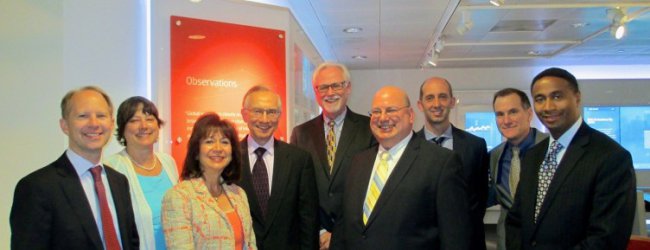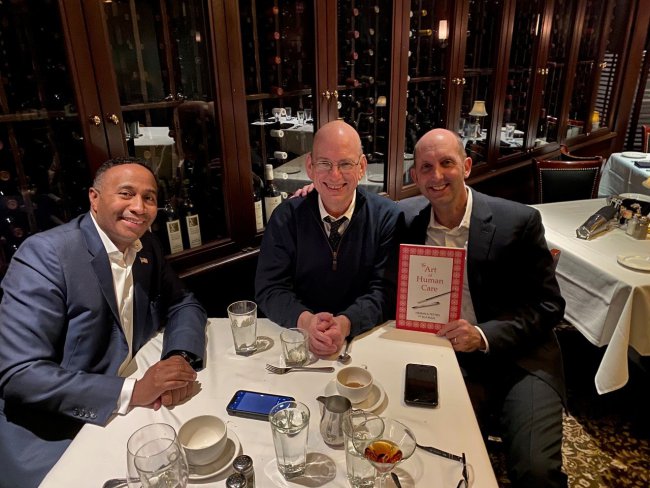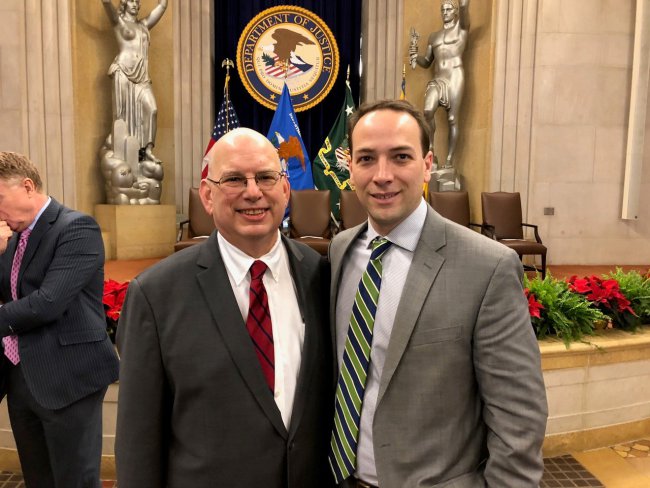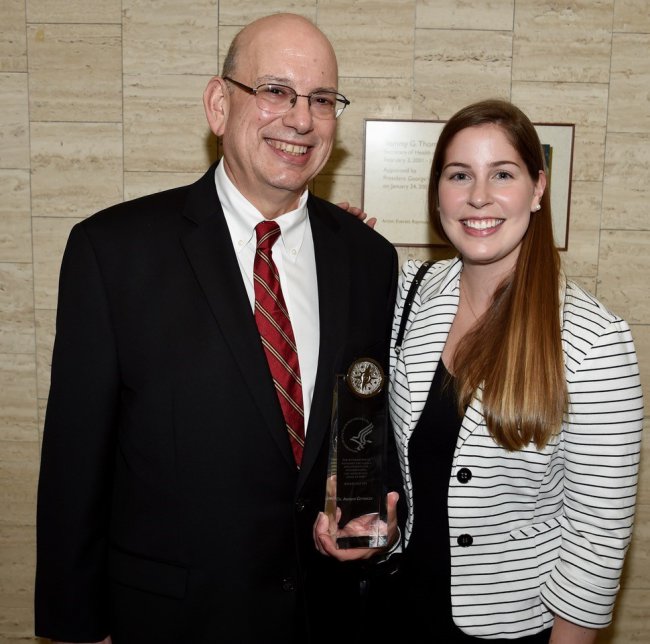May 16, 2023
Sending Clinicians to Congress: The Need for Real-World Clinical Experience to Inform Health Policymaking in Washington

For nearly 50 years, the Robert Wood Johnson Foundation (RWJF) Health Policy Fellows program has sought to build a strong, diverse network of leaders and maintain a workforce skilled in health policy. By connecting health professionals with the first-hand opportunity to participate in the federal policy process, this nonpartisan program aims to improve health equity, health care, and health policy. To learn more about the fellowship experience, we hear from Dr. Andy Gettinger, a fellow from the class of 2012–2013. In the interview below, Gettinger highlights his most memorable fellowship projects, the social connections he formed, and the value the program offers to participants.
For the first part of his career, Gettinger was a successful physician running the ICU at Dartmouth-Hitchcock Medical Center in Lebanon, New Hampshire, and then serving as its Chief Medical Information Officer. But when a mentor advised him to go to Washington, DC, to “do something bigger,” that led him to apply for the RWJF Health Policy Fellows program.
During the program, Gettinger was able to bring more attention to his passion: the field of clinical informatics. Also, while serving in the U.S. Senate in the office of Orrin Hatch (R-Utah), he lent his real-world experience as a physician and anesthesiologist to congressional hearings, leading to legislation that addressed a critical medical safety issue that was the result of an unknown gap in regulatory oversight. He shares more about his experiences, what he got from the fellowship, and his advice for prospective fellows below.
Can you tell us about your background?
I’m a physician, an anesthesiologist. I went to college and medical school at Dartmouth, then came back and joined the faculty at Dartmouth Medical School in 1983 after doing a couple of internships and residencies, as well as two fellowships. I’m also one of the first board-certified critical care physicians—in fact, I helped write some of the certification questions—and I ran the ICU at Dartmouth for about a decade.
I had a career transition in the early 1990s to the field of clinical informatics. I left the ICU for the role of Medical Director of Information Systems, which was created for me at Dartmouth-Hitchcock to lead the development of its in-house electronic medical record system. I was supposed to do it for a year and ended up staying from the mid-1990s until 2012—so a little bit more than a year! Ultimately, I had the title of Chief Medical Information Officer. I founded the informatics program at Dartmouth, and I was a Professor and the Associate Dean for Clinical Informatics at the Medical School.

How did you get interested in the RWJF Health Policy Fellows Program?
I first looked at the RWJF Fellows Program in the 1990s, when I was just a simple critical care doc, because of a man here by the name of Jack Wennberg. He’s fairly well-known for a lot of his pioneering research using claims databases. He was the progenitor of the group that developed what’s now called the Dartmouth Atlas and was a real leader in the field of defining the small-area variations in health care and the variations between what happened in one community versus another community. He encouraged me to do the fellowship and told me he would be highly supportive. However, family circumstances in the 1990s didn’t allow for me to do that.
“One important thing about the fellowship is that it’s really a very diverse community.”
A subsequent mentor, Dr. C. Everett Koop, looked at me one day and said, “Andy, it’s time for you to leave.” He advised me to go to Washington, DC, to do something bigger than what I was currently doing. So, I applied.
I got accepted to the program and went to Washington. I can remember the briefing sessions as a fellow. I had a very strong cohort, the class of 2012–2013. Barbara Damron became a very close friend and we tried to organize a lot of social things for the group. The social activity outside of the formal program is a very, very important element to the fellowship.
One important thing about the fellowship is that it’s really a very diverse community. Another is that when people come to their fellowship, they may not know how they’re going to end up, which is a wonderful thing. If you asked me at the outset of the fellowship if it was going to lead to almost 10 years in Washington, I would have said that it’s unlikely that I’m going to get what’s called Potomac Fever. I don’t think I had Potomac Fever, but maybe a Potomac cold instead!
Were there particular issues you were hoping to work on during the fellowship?
I came to Washington recognizing a problem of patient identity—that we don’t have a good way to identify a patient. That became even clearer during COVID, but it was clear prior to that. To use me as an example, I could be listed as Andrew Gettinger, Andrew/Andy Gettinger, or A. Gettinger, MD—and my name is actually rather unique. The last time I looked, I was the only Andrew Gettinger in the country. Now, the Chief Information Officer that I partnered with for all that time at Dartmouth-Hitchcock was named Peter Johnson. Even in our system, we had 123 Peter Johnsons. His middle name was Allen. We had 5 Peter A. Johnsons. If you scaled that up to a national level, there would be thousands of Peter A. Johnsons, many with the same date of birth. I presented about this patient identity issue during some of the early presentations the fellows did with each other, and also presented it to Institute of Medicine President at the time, Harvey Fineberg.
The next year, after my fellowship, I stayed in Washington, working with Health IT Safety at the Office of the National Coordinator for Health Information Technology. That started a 7-to-8-year course of working at the Department of Health and Human Services, where I ultimately was in the Senior Executive Service, and the Chief Clinical Officer for the agency. One of my portfolio projects was, among other things, working on the patient identifier.

Can you tell us about your placement during the fellowship, the work you did there, and any goals you were hoping to accomplish?
I ended up in the office of Senator Orrin Hatch from Utah, which was wonderful for me, even though I’m not a Republican. I’m not a Democrat, either—I’m an independent from New Hampshire. Having no political affiliation allowed me not to have an agenda representing either party. At the time, Senator Hatch was the ranking member of the Senate Finance Committee and the past Chair of the Health Committee. Those two committees, with jurisdiction in all of health care, could not have been a better assignment for me. Senator Hatch considered me part of the finance staff. I staffed hearing meetings and jointly developed, with one of the other fellows in my program who was on the Democratic side, a hearing on health information technology in two separate sessions.
“I think there’s a fundamental need for Congressional staff and elected officials to have expertise from actual clinicians… That was really my goal—to provide expertise within the office—and I think that’s a really good example of what the fellowship does.”
As one example, in 2011 and 2012 there was a series of problems with patients who had pain blocks, predominantly epidural blocks, becoming paralyzed. When we were doing our briefings, we went to the Centers for Disease Control and Prevention (CDC). The folks of the CDC identified that the problem was contaminated compounded steroids that were being used by anesthesiologists when they did the blocks. The steroids were contaminated with a very rare fungus. There were even a few deaths associated with this, so it was a big deal.
What it subsequently revealed was there was a regulatory void between what the Food and Drug Administration (FDA) regulated, and what state pharmacy boards regulated relative to compounding, which is managed by state boards. In most places, you are talking about the mom-and-pop pharmacist, and the pharmacist does a little bit of this, and mixes in a little bit of that, and creates an ointment that the doctor prescribes. What emerged was there were essentially drug manufacturers masquerading as compounding facilities with no oversight because state boards did not think they had authority and the FDA didn’t have authority, so that became an issue. I worked on that issue with the Senate Health Committee and added my expertise as an anesthesiologist who does epidurals about how that could happen. That led to legislation that got passed and became the law.
I think there’s a fundamental need for Congressional staff and elected officials to have expertise from actual clinicians so that they’re not responding just to the myriad of third-party lobbyists and other folks that try and influence their decision-making. That was really my goal—to provide expertise within the office—and I think that’s a really good example of what the fellowship does.
I’m happy to have spent the year and I have counseled others to recruit people into the program. I have a couple of candidates that are bouncing along in their career that I think will subsequently apply that I’d be really enthusiastic about. I’ve stayed relatively well-connected to the program, and I try to get to all the meetings. It was easy when I lived two blocks away. It’s a little bit harder now, and obviously COVID had an impact as well. The fellowship was a great window of time for me, and just as great as being a simple country clinical informaticist is now. Since I retired last April, I’m enjoying being a grandfather, and occasionally doing some things I like.

What advice would you have for individuals considering the program, whether during the application stage, making connections, or things they should research?
One of the first things I’d advise is to learn about the program. Talk to people who’ve been in the program. I have yet to find an alum of the program who isn’t very happy to make time, regardless of how busy they are, to talk to prospective applicants. I almost think it’s an obligation to pay it forward. Folks spent time talking to me—there were three or four people at Dartmouth who had done the fellowship.
Also, I’ve seen folks who I have counseled and guided not getting accepted one year, since it’s a selective program, but get in the next year. So, I also tell people not to get discouraged.
Learn more about RWJF Health Policy Fellows by following us on LinkedIn! For more information about the upcoming fellowship application, visit our website. We appreciate your support in building a strong and diverse network leaders and maintaining a workforce skilled in health policy. Email info@healthpolicyfellows.local for questions about program opportunities.